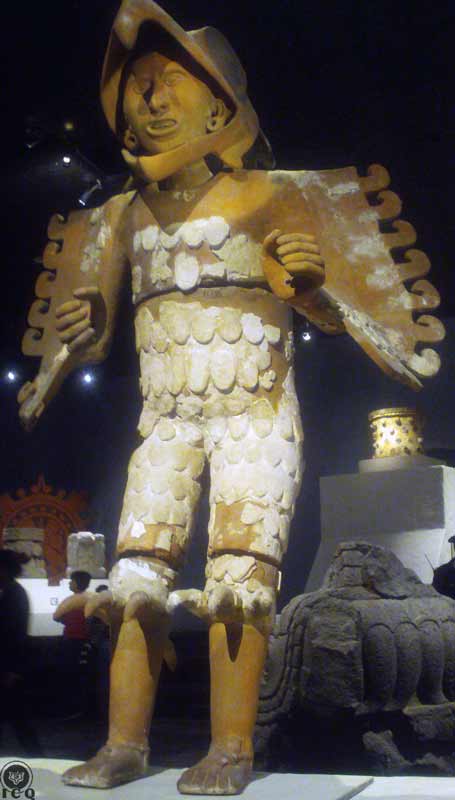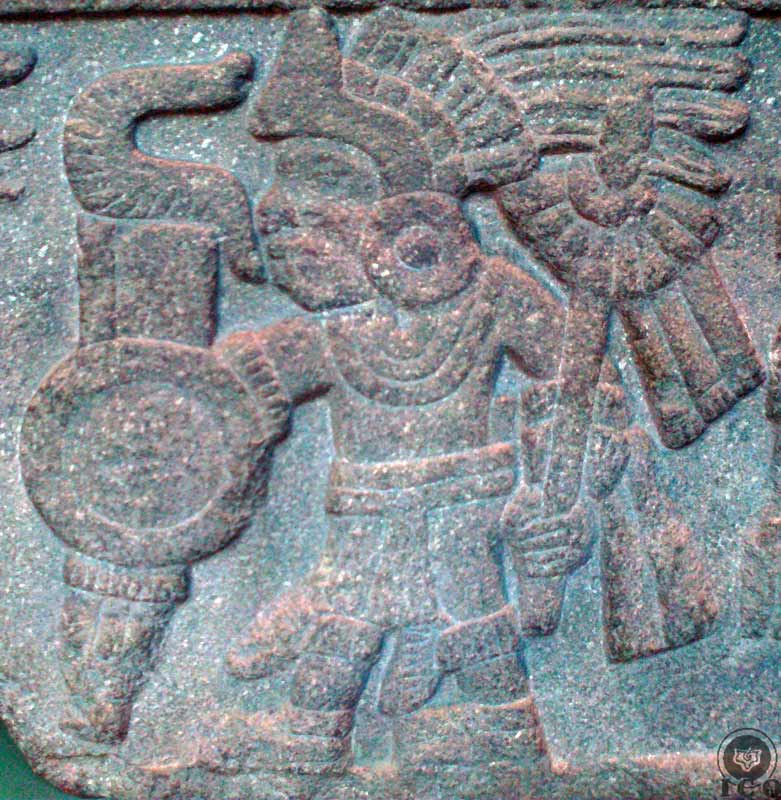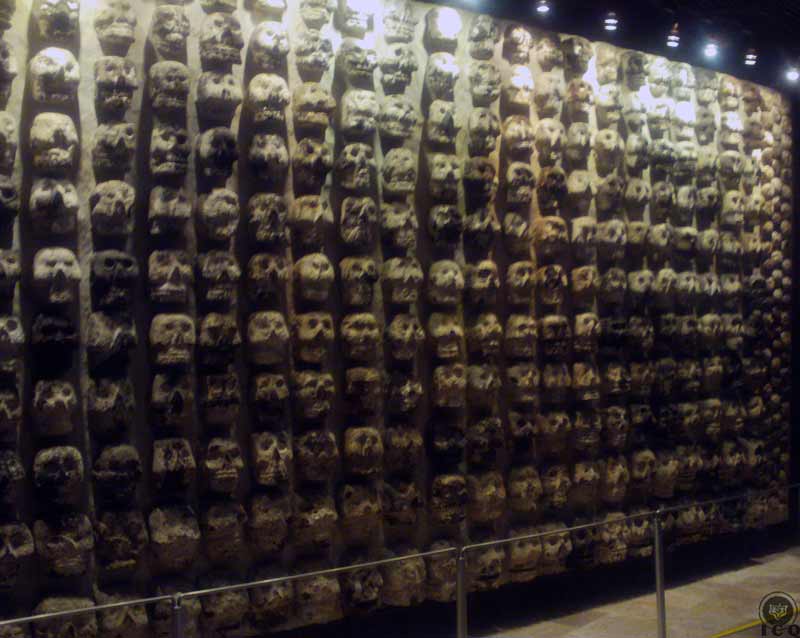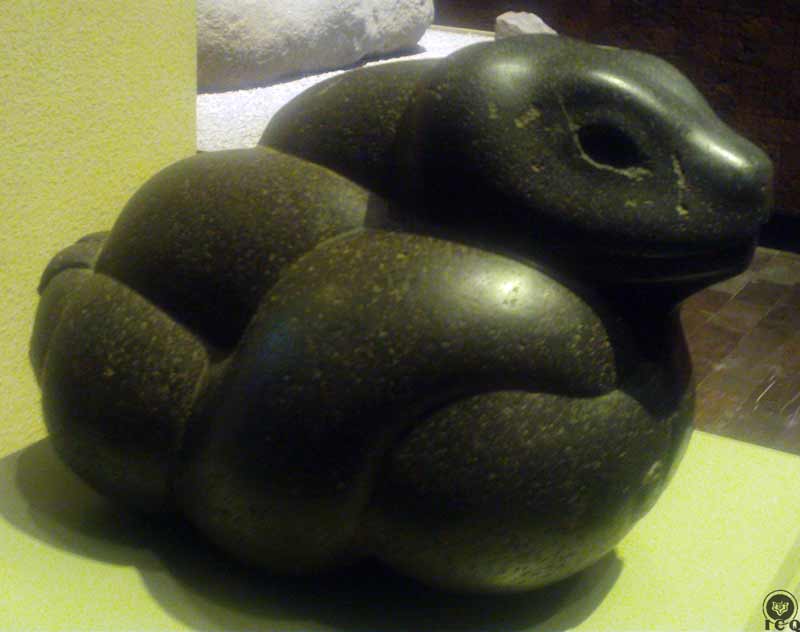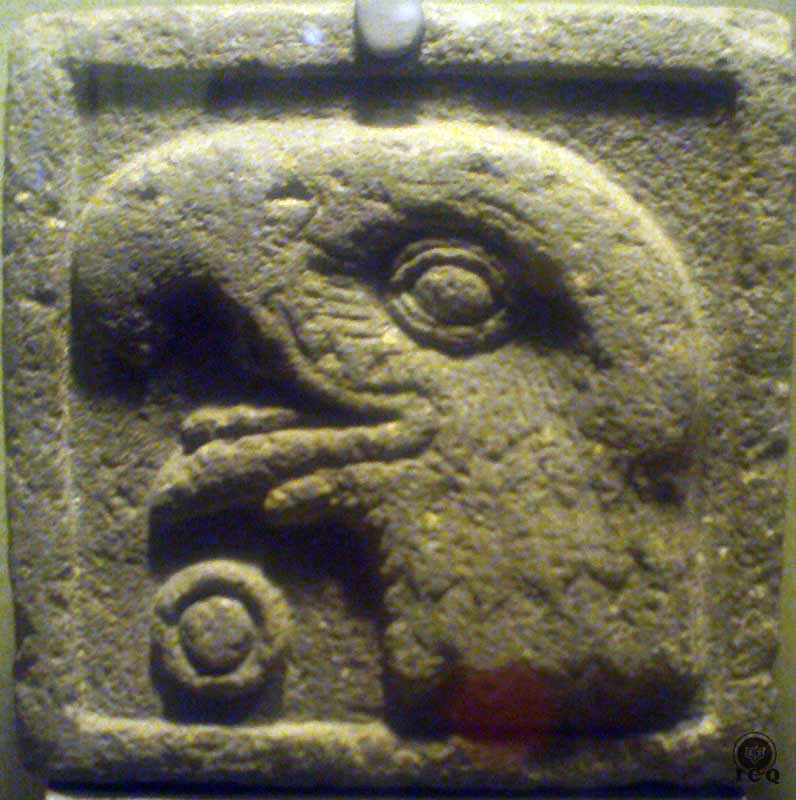The Birth of the Left-Handed Hummingbird [Huitzilopochtli]
Chapter 5 - The State of Alert Novelty
The only way we can discover our psychological defects is by directing our attention inboard, into our psychological space. We must be as the lookout during the time of war, but not to observing others, but our own selves.
"And one of name Cuahuitlicac made use of his words for falsehood. All that was said by the Four-Hundred Southerners, he carried over and told Huitzilopochtli. And Huitzilopochtli in turn would reply: "Be careful and remain vigilant uncle of mine, as I know very well of what I must do." Florentine Codex
Our ignorance about the high level of activity of our ego serves to the ego's own advantage. All of this activity takes place within us and what we get to perceive, is a mere fraction of all it does.
This is why we must cause the emergence of "The Standing Eagle" [Cuahuitlicac] – one of the Four-Hundred Southerners – within us. He was the one aware of all of the dark plans of his brothers and also the one who went to the "Left-Handed Hummingbird" [Huitzilopochtli] to warn him, though he was still in the womb.
We must not think "The Standing Eagle" [Cuahuitlicac] is just one more psychological aggregate. The teaching invites us to develop the superior discipline of self-observation, in such a quality that we create the impression that we stand right next to our aggregates as we observe them. This effort requires of our total attention into our mind and to what is perceived by our senses, which is why Gautama the Buddha said:
"Glory to him who makes the effort and remains vigilant, who is pure in his conduct, considerate, self-controlled, who lives a life of righteousness, and who is capable of holding an ever-growing attention." Dhammapada
An Eagle-Knight (Museum of the Major Temple, Mexico)
The Attack of the Southerners
"And when they had managed all to make their mind, the Four-Hundred Southerners were resolute, and they went off to kill their mother. They were led by Coyolxauhqui." Florentine Codex
The vast majority of the activities we hold on a day-to-day basis are inclusive of the involvement of our psychological aggregates (our individual and particular Four-Hundred Southerners) and these are the ones that manifest aspects like ambition, envy, pride, laziness, self-worth, etc., and frankly all it takes is a little self-observation to realize that many of them are driven by lust. They are led by our internal "One Adorned with Rattles" [Coyolxauhqui].
But we have become so accustomed to the false gratification of these manifestations that we fail to realize they are resolute to destroy those aspects which are truly divine and real; kindness, compassion, love, and all other superlative virtues. In other words, for as long as we do not work towards their elimination, we are then also conspiring to destroy that which is sacred. And today we do not stop to reflect; meanwhile our remorse continues fading away and we continue to live our lives thinking that these defects are just part of ourselves, so we justify our mistakes assuring we have committed no wrong.
"They wore their rugged attire for warfare; they distributed amongst themselves their paper garments, their anecuyotl, their nettles, their adornments of colored paper, they tied handbells around their calves – handbells called oyohualli. Even their spears had serrated tips." Florentine Codex
It is almost impossible to enumerate all our defects. Vigil, the poet of Mantua wrote:
"Even if we had a thousand tongues to speak and a palate of steel, we would still be unable to enumerate all our defects."
Our defects are rugged and their level of complexity is such that we can find them behind the totality of our actions, our sentiments and our thoughts.
Their means of manifestation are intricate and imperceptible because of the deep sleep of our consciousness, and yet, deep within our psyche they are dressed in their war attires and ready to fight for the elimination of our superior values that are of a transcendental nature.
They are experts creating distractions as they confront us in the internal battle, which is symbolized by the Southerners dressing up with their paper attires, the wearing of animalesque adornments on their heads (the anecuyotl), the distractions of their nettles, the handbells on their calves [oyohualli], and the spears with serrated tips; these are all allegories to the many distractions by which the ego deceives.
How many times have we not tried to end a vice or a bad habit, to find that our individual and particular Four-Hundred Southerners dress up for war and create internal distractions that lead us to failure? In most instances that happens without us even realizing what has taken place and thus, we fall back into creating justifications for our incorrect attitudes and continual changes of mind.
"For example, if we are cruel with our wife, children, relatives, etc., we ignore it… The worst thing is that we allow this situation to continue, especially because we like it, and because it is so easy; and if someone accuses us of cruelty, we will probably smile, thinking they do not comprehend our righteousness, mercy, and infinite love...
"We are caught in the horrifying coils of the great serpent, yet we believe ourselves to be free." Samael Aun Weor. The Secret Doctrine of Anahuac.
Then they got moving, they went in order, in a row, in orderly squadron, guiding them Coyolxauhqui. Florentine Codex
The many thousands of defects we carry within are in constant movement, their strategies are much defined, they intertwine with each other, and they are never alone. In many instances these defects will allow for the manifestation of lesser defects that go undetected, and when we least expect it, these have created associations with other much perverse and harmful, taking over control over our human machine.
We live in the midst of all of this, without ever thinking not even for an instant, these events are taking place; we are victims of our own creations and much worse, we do not even understand the complexity of the chaos we have created.
A warrior. (Museum of History and Anthropology, Mexico)
Psychological Self-Observation
"And Cuahuitlicac rushed up the mountain to speak from there to Huitzilopochtli and said: 'They're coming'." Florentine Codex
Not everything is lost because within each human being exists not only the causes of their own sufferings and misfortunes, but also the very capacity to overcome them.
The secret is allowing "The Standing Eagle" [Cuahuitlicac] to manifest within us; the eagle represents a superior state of alertness and it is shown standing to emphasize the urgency behind the mystical quest with all of its attention focused on the internal realms. The eagle is a symbol of that part of ourselves that can thrive on self-criticism, because...
"He who criticizes others is weak, while he who criticizes himself from moment to moment, a colossus." Samael Aun Weor
"The Rows of Heads" [Tzompantitlan]
"Huitzilopochtli asked: 'Where are they coming from?'. Cuahuitlicac answered: 'They are already by Tzompantitlan'". Florentine Codex
The Four-Hundred Southerners had already reached the heights of the place known as "the rows of heads" [Tzompantitlan]. This is the place where the craniums of enemies defeated in previous battles were set on stakes and arranged in rows.
Our ego is the root cause of all our illnesses, our sufferings and our death. This is why the Southerners are seen walking "between the rows of heads", because the heads of the enemies symbolize our pain and suffering and the Southerners, the ego in manifestation.
The instruction from our internal Christ called "The Left-Handed Hummingbird" [Huitzilopochtli] is that of observing where are our psychological defects, to understand what harm they are causing us, what harm they are creating to our neighbor, and how much more damage they can effect if they were to remain in existence.
"It is very clear and not difficult to comprehend that when one seriously begins to observe oneself from the point of view that the "myself" is not "one" but "many," one then really begins to work on all that is carried within." Samael Aun Weor. Treatise of Revolutionary Psychology.
The Wall of Heads [Tzompantli] (Museum of the Major Temple, Mexico)
"The Sands of the Serpent" [Coaxalpan]
"And yet again Huitzilopochtli asked: 'Where are they now?' and Cuahuitlicac replied: 'They have reached the Coaxalpan'." Florentine Codex.
Sand, rocks, stones and serpents are all symbols of the sexual creative power.
It becomes of vital importance for us to know "where are they coming from" so we can comprehend our aggregates as they manifest through our habits, our intellect, our emotions, our instinct, and our sexuality. As we observe ourselves, we can find out that a naïve friendship with someone from the opposite sex could manifest as a beautiful ideal in the mind, as love in our emotions, and with certain morbidity in our sexuality. In many instances we even experience adultery within the mind and all of this, without noticing.
Knotted Serpent. (Museum of History and Anthropology, Mexico)
The Hillside of the Mountain
"And then again Huitzilopochtli asked Cuahuitlicac: 'Observe where they are coming from'. Cuahuitlicac replied: 'They have reached the hillside of the mountain'." Florentine Codex
Not all our defects are horrendous; many of them present themselves so subtly that they even manage to become part of the most sincere longings that are part of the internal work, meaning that even the most sincere, experienced, practitioners of the internal work will find defects as they climb their individual mountain of initiation.
It is vital that we maintain a state of alert novelty and alert perception to what takes place in our mind, because it is common to see those who walk into these studies who forget to remain "observant of where they are coming from" and as time goes by, they start thinking of themselves as the reincarnation of someone famous, or they start feeling realized and spiritually successful, or perhaps start calling themselves an "old soul"; when deep inside those expressions are no more than pride and obviously, their efforts derail from the path.
"Hindrances, obstacles, stumbling blocks for the work of intimate Self-observation, such are the following psychological defects: Megalomania: delusions of grandeur, to believe that one is a God. Self-worship: belief in a permanent "I," adoration of any type of alter-ego. Paranoia: the know-it-all ignoramus, self-sufficiency, vanity, thinking oneself infallible, mystical pride, a person who does not like to see another person's point of view." Samael Aun Weor. Treatise of Revolutionary Psychology.
Huitzilopochtli is clear: "Observe where they are coming from". Our internal state of alertness must be intensified for all our activities, during each one of our meals, at work, at the time of study, even when having fun. It is when we are interacting with others that we can see where our psychological defects "come from".
But observation is only part of the effort. We must observe our own observations, which is only possible through the effort of deep and profound meditation of that which we have discovered. Anyone who chooses to start working upon themselves will inevitably begin the effort of self-discovery.
It is more than impossible for us to eliminate what we do not know exists, so in our efforts, we must strive to discover the very roots of the defect we wish to eliminate. Until there is no comprehension, there cannot be elimination.
"It is not enough to intellectually comprehend the psychological defect. It is necessary to submerge ourselves into profound inner Meditation in order to catch the defect in all the levels of the mind." Samael Aun Weor. The Revolution of the Dialectic.
At the Top of the Mountain
"And yet once again asked Huitzilopochtli: 'Observe where they come from'. Cuahuitlicac replied: 'They have reached the top of the mountain… they are here… Coyolxauhqui is leading them'." Florentine Codex
Sivananda refers to this path as "the path of the double-edged blade" because it offers dangers up, down, inside and out. In this work we cannot afford to not remain vigilant and let off our guard, because whenever we are thinking we are doing well, in reality we are not. The sentiments of "doing well" are specific to any one ego that has assumed control of our mind and our heart.
Our defects can disguise themselves with the masks of the most profound longings and take us straight to hell, as it has been written: "The path to hell has been paved with the cobblestones of good intentions." This is why it becomes of utmost importance to keep an eye on the Four-Hundred Southerners that are led by the destructive fire of lust, and to know where they are coming from at every moment.
"The "I" is always perverse; sometimes it adorns itself with beautiful virtues and even wears the robe of sanctity. When the "I" wants to cease to exist, it does not do it in a disinterested and pure manner; it wants to continue in a different manner; it aspires for reward and happiness." Samael Aun Weor. The Revolution of the Dialectic
In the Eastern doctrine, the wise ones say that we must be very attentive towards our own selves, just like the cat is watchful over the mouse and the hen over her eggs. This intensified state of alertness is what enables the emergence of "The Standing Eagle" [Cuahuitlicac] in each one of us.
"Vigilance and lucidity are the paths to immortality. Those who remain watchful stay alive. Negligence is the path of death. Those who are negligent are as good as dead." Buddha
(Number) One-Eagle. (Museum of History and Anthropology, Mexico)

